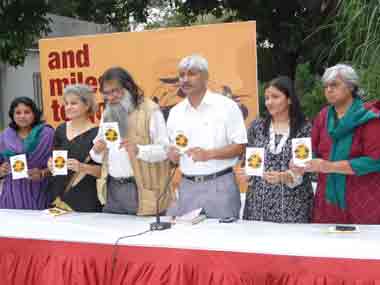She was unwell that night. Lying on the bed in her Juhapura house, Noorjahan switched on television. Images of charred human bodies, crying children, smoking houses and blood on the roads made her feel sick. She switched off the television and went to sleep. The next morning, 28 February, 2002, Noorjahan was on her way to a hospital in Vasna, located 3 kilometres from her house. There was an uneasy calm on the roads. In the distance, she saw a tempo carrying around 30 boys. They were armed with swords and hockey sticks. “Jai Bajrang Bali,” they said in chorus. “A train has been burnt in Godhra. That is why these riots here,” her husband told her. [caption id=“attachment_283861” align=“alignleft” width=“380” caption="(Left to right) Noorjahan Diwan, grassroot worker from Ahmedababd, Sayeeda Hameed, member, planning commission, Abhijit Sen, member, planning commission, Apporvanand, professor, Delhi University, Zakiya Soman, founder, ‘Bhartiya Muslim Mahila Andolan’ and Sahbnam Hashmi, founder trustee, ANHAD during the launch of the book in Delhi on Friday. Image courtesy ANHAD"]  [/caption]“Why will burning of a train in Godhra lead to riots in Ahmedabad?” asked a curious Noorjahan from behind the black burqa. She would receive her answer soon. In the months to come, Noorjahan Abdul Hameed Diwan would dump her identity of a house wife, her shyness and burqa to work for riot affected victims. “For the first six months of me working in the relief camps, my husband did not talk to me. I am married into a family of clerics. The daughter-in-law of the family working as a social activist was an unbelievable idea for them,” said Noorjahan, when asked about the resistance she faced from her in-laws. Noorjahan said that in the last ten years, her husband has threatened her with divorce on many occasions. “My fight is on two fronts: with my family which has issues with me working for the victims and with the system which has not given justice to the aggrieved,” she said. ‘And miles to go…’ a book released on Friday, narrates how Gujarat riots of 2002 influenced the lives of five Muslim women- Noorjahan Diwan, Shabnam Hashmi, Sofiya Khan, Sayeda Hameed and Zakia Soman in ways they may not have imagined. Hameed, currently a member of the Planning Commission, was part of a government-appointed six member women team that reached Ahmedabad a month after the burning of Sabarmati Express. She was shocked to see the precision with which properties only belonging to Muslims were burnt. She also found it surprising that within no time, the Hindu dominated areas returned to normalcy. “At night the upmarket restaurants of Vatrapur and Law Gardens were filled with families celebrating pre-Holi feasts. A stone’s throw away, was the Shah Aalam camp where a thousand victims were herded together, broken in body and in mind. The two Ahmedabads, like a tale of two cities, cried fair and foul; which we, a small team of women, tried to comprehend,” she writes in the book. Hameed said that during her stay in Ahmedabad she feared for her life. Every night, she said, she dragged a heavy piece of furniture to block the door in case the mobs decided to go on a hunt for Muslims inside the hotel. “Not for a moment did I think of police or guards being responsible for my safety. As a Muslim woman, I have never been able to completely shed that distrust and fear,” Hameed said. Zakiya Soman gave up the job of a lecturer of English and Communication in Gujarat University and founded ‘Bhartiya Muslim Mahila Andolan’, an organization which works for the cause of riot victims. She said events of 2002 defined her for what she had become. Soman felt she had failed as a person since despite belonging to an influential family she could not arrange for help for the families when they were attacked by mobs . “I phoned all the top police officials. I broke down on phone. But they did not move,” she said. “I have learnt that the world can dismiss me in one word- Muslim. That I am a woman, a mother, a friend, a colleague and a citizen of independent India, does not matter anymore," Soman said. Shabnam Hashmi, founder trustee of ANHAD (Act Now for Harmony and Democracy), said that during the course of her work in the state, she encountered many realities which she had never experienced before as a social worker. “I thought I was strong. I would not cry. But then, I cried almost every night during my stay in Ahmedabad,” she said. Hashmi added that the extent of distrust among the riot victims had reached the levels where they could not differentiate between a social worker and a hooligan. “People turned down the help extended by many of my teammates and me. It was very challenging to win their confidence,” she said. “Sometimes I wonder how many kinds of discrimination we have to fight against,” she added.
A moment of violence turned the lives of five women upside down. And now they’re speaking out: “I have learnt that the world can dismiss me in one word: Muslim," one of the women said.
Advertisement
End of Article


)
)
)
)
)
)
)
)
)



